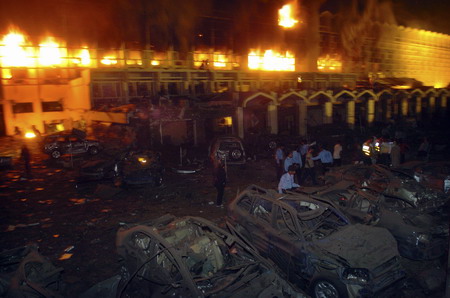Rehman Malik, the head of the Interior Ministry, told The Associated Press that it was unclear who was behind the attack and that there had been no claim of responsibility, but that authorities had received intelligence that there might be militant activity due to Zardari's address to Parliament. Security had been tightened, he said.

Damage is seen at the Marriott Hotel after after a suicide attack, in Islamabad September 20, 2008. A suicide truck bomber attacked the Marriott Hotel in Islamabad on Saturday, killing at least 53 people, wounding nearly 250 and starting a fire that swept through the building in the Pakistani capital. [Agencies]
|
Witnesses said they saw a large truck drive up to the fortified main gate of the hotel at about 8 p.m. (1400 GMT), when its restaurants would have been packed with diners, including Muslims breaking the Ramadan fast.
Mohammed Asghar, a worker from a nearby office with a makeshift bandage round his head, said there was more than one man in the truck and that they had argued with the hotel guards.
"Then, there was a flash of light, the truck caught fire and then exploded with an enormous bang," he said.
Senior police official Asghar Raza Gardaizi estimated that the blast, which reverberated throughout Islamabad, was caused by more than 2,200 pounds (1,000 kilograms) of explosives.
In the pandemonium that followed, AP reporters saw at least nine dead bodies at the scene. Scores of people ran or staggered from the building, many of them bloodied and covered in dust.
A US State Department official led three colleagues through the rubble from the charred building, one of them bleeding heavily from a wound on the side of his head.
One of the four, who identified himself only as Tony, said they had begun moving toward the rear of the Chinese restaurant after a first, small blast and that the second explosion threw them against the back wall.
"Then we saw a big truck coming to the gates," he said. "After that, it was just smoke and darkness."

